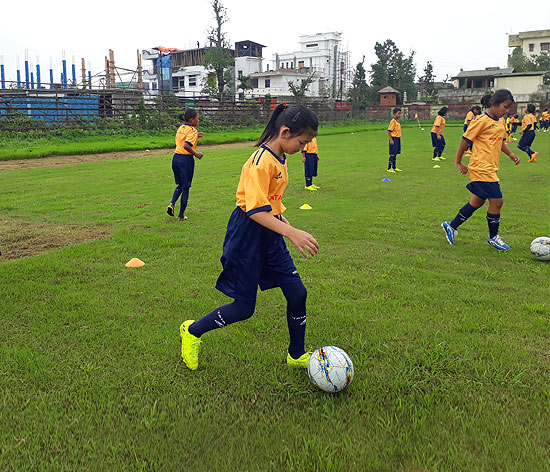
The name ‘Bembem Devi’ is one that commands respect in the field of Indian football. Her contribution to the beautiful game in India is deserving of more than a tip of the hat. Yet, despite boasting of the greatest number of national team caps – 85 – Bembem’s club career with Eastern Sporting Union (ESU) is a startling eye-opener to the dire need for support for women’s football in India.
ESU’s very existence is dependent on the donation made by the patrons of the club. This, despite the fact that the club features some of the best names in women’s football in the country. “While club patrons have been very generous, if a club is run solely on the goodwill of well-wishers, you have to forego the professional element,” explains Dr Irengbam Homendro, team doctor and ESU in-charge. “No one can hold coaches or staff accountable when day-to-day working is not looked after in an orderly fashion. Because all the time devoted to the club is voluntary.”
Setting goal posts
In 2017, when ESU participated in the inaugural Indian Women’s League, the club stormed through the league matches to be crowned champions. The Tata Trusts’ support for ESU now extended further to financial and logistical assistance for the talented young women.
Besides assistance to the senior and junior teams of the club, the Trusts also set up a grassroots training centre for young girls between the ages of 6 and 14 in April 2018. This centre, solely dedicated to the training of female footballers, worked to initiate girls into the game as early as possible. Around 80 girls from the senior and junior teams as well as the centre are benefitting from the programme on a holistic level.
“We aim to help not just ESU, but in the larger context the Indian national team to have a steady source of trained footballers, and we would also like to push these girls towards a healthy, active life away from negative influences,” says Dr Homendro. “Most of the girls who are a part of this programme come from extremely humble backgrounds,” he adds. “They are more susceptible to being lured into substance abuse. Here, they discover football as a viable alternative path to lead their life.”
The financial support from the Trusts has also enabled the girls build their physical fitness through a healthy and nutritious diet. Earlier, ESU had been fiscally unable to provide them with a good diet despite knowing that it was an integral part of athlete building.
Building champions
Dr Homendro also believes that with the Trusts’ support, ESU can come up with a second generation of players to follow in Bembem Devi’s footsteps. His optimism is not unfounded — ESU were runners up in the 2018 Indian Women’s League. Not only that, ESU players Umapati Devi and Prameshwori Devi bagged the IWL Player of the League awards in 2017 and 2018 respectively, while goalkeeper Elangbam Panthoi Chanu was awarded the All India Football Federation (AIFF) Emerging Woman Player of the Year in 2017, and striker Yumnam Kamala Devi, the AIFF Woman Player of the Year in 2017. Moreover, three ESU players have been selected for the U-15 national football team.
ESU’s goalkeeper agrees with the doctor’s train of thought. She had transferred from the Women’s Football Club (WFC) to ESU in 2014. “WFC couldn’t provide us with training kits or boots, and we couldn’t compete professionally as they didn’t have funds,” says Panthoi. “Neither did ESU until the Trusts intervened. Now, we get quality kits, healthy food, and most importantly, we get to go on tours and play professionally. The professional training we get now has upped the quality of our game immensely.”
The Tata Trusts’ initiative will not only help to nurture young football talent in the country, but also help young athletes achieve the right balance between sports and education.
